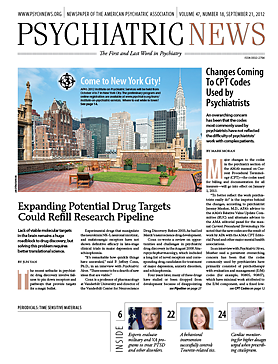In the “From the Experts” column in the May 18 issue, Jon G. Allen, M.D., proposed that “mentalizing” is the most fundamental common factor in the diverse forms of psychotherapy, including both the specialized ones (CBT, DBT, TFP, ERP, SIT, IPT, EMDR, and so on) and what he calls “plain old therapy” as practiced by generalists. Mentalizing was defined as “cultivating awareness of mental states such as thoughts and feelings in self and others.”
This mistakes a part for the whole. An alternative and, I believe, more comprehensive view is that the most common factor in the psychotherapies is learning. Learning can be defined as “a change in response potential due to experience.” Most would probably agree that psychotherapy is an experience and, if successful, results in a change in response potential. Perhaps Allen might further agree that mentalizing is a capacity that can be either enhanced or overridden by learning. The various therapies differ with respect to what is learned and how.
Just as there are many kinds of therapy, so there are many kinds of learning. Some require conscious awareness and some do not. Teaching and learning in school rely almost exclusively on learning that requires conscious awareness. This is probably less true of learning in the psychotherapies, including “plain old therapy.” It is gradually becoming possible, at least tentatively, to map psychotherapy techniques onto learning paradigms and to map learning paradigms onto neural circuits. This of course still has a long way to go, but what seems apparent is that most neural circuits can learn, or as neuroscientists prefer to say, “exhibit plasticity.” Some responses can be learned with lightning-like speed (“prepared”) and some only with great difficulty (“counterprepared”). Different responses are mediated by different circuits, but the biological changes are similar across circuits.
Allen emphasizes the importance of therapeutic relationships on outcome in all the psychotherapies. This is a special case of the more-general proposition that relationships and adaptive learning feed on each other, not only in psychotherapy, but in school and in life. The components of therapeutic relationships have not so far been thoroughly analyzed, but there is some consensus that part of what goes on can be characterized as teaching and learning—learning, that is, in the broad sense used here.

GEORGE CURTIS, M.D.Grand Marais, Mich
Readers are invited to submit letters up to 500 words long for possible publication.
Psychiatric News reserves the right to edit letters and to publish them in all editions, print, electronic, or other media. Receipt of letters is not acknowledged. Letters should be sent by mail to
Psychiatric News, APA, Suite 1825, 1000 Wilson Boulevard, Arlington, Va. 22209 or by e-mail to
cbrown@ psych.org . Clinical opinions in letters are not peer reviewed and thus should be independently verified.

